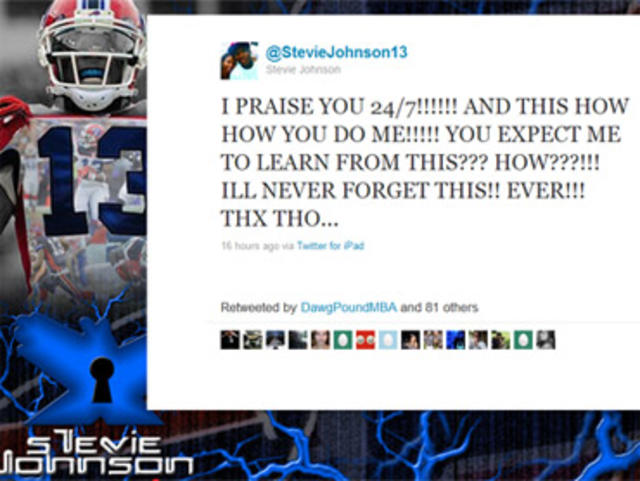
Throughout November we’re taking an in-depth look at Ruth, the little book that helped pave the way for God’s Messiah to come into the world.
Eleven years ago this fall, the Buffalo Bills – at that time one of the least competitive franchises in the National Football League – had a golden opportunity to defeat the Pittsburgh Steelers, one of the NFL’s perennial powerhouses.
Early in overtime – where a touchdown meant instant victory – the Bills’ quarterback threw a perfect pass to the team’s star receiver, Stevie Johnson, who was wide open in the end zone.
Johnson, wearing his lucky No. 13, reached out to make history. Incredibly, the ball slipped right through his fingers. The Steelers went on to win the game.
After the game Johnson, an active churchgoer, took to Twitter to explain how he could possibly have dropped that pass. It was God’s fault. “I PRAISE YOU 24/7!!!!!! AND THIS HOW YOU DO ME!!!!! YOU EXPECT ME TO LEARN FROM THIS??? HOW???!!! I’LL NEVER FORGET THIS!! EVER!!!” At least he added this afterthought: “THX THO…”
If Twitter had been around 1100 years before Christ, Naomi might have typed the same words in capital letters and even added a few more exclamation points.
During the first half of the book of Ruth, the elderly widow rages against God. “The hand of the Lord has gone out against me,” she declares. In her anguish she cannot see any reason why God would allow so many disasters to cloud her life. The simple explanation is that God is her enemy.
But all that is about to change.
When her widowed daughter-in-law comes home bearing a jaw-dropping amount of grain, Naomi discovers that Ruth somehow ended up spending the day gleaning in the field of a man named Boaz. She suddenly lights up. “’The Lord bless him,’ Naomi said to her daughter-in-law. ‘He has not stopped showing his kindness to the living and the dead.’ She added, ‘That man is our close relative; he is one of our kinsmen-redeemers’” (Ruth 2:20).
It’s worth noting that Ruth 2:20 is located at the absolute center of the book of Ruth.
This is not an accident.
Hebrew writers occasionally structured their compositions in such a way that a central statement or thought or assurance gives meaning to everything else. The entire text flows toward that verse, and then everything flows away from that verse. Such a thematic center is like a hinge on which everything turns.
John 10:30 is a good example: “[Jesus said], “I and the Father are one.” That powerful statement sits at the absolute center of the Gospel of John’s 21 chapters. It can be argued that it sums up everything the book hopes to teach.
The Lord’s Prayer (Matthew 6:9-13) is situated right at the center of Jesus’ Sermon on the Mount (Matthew chapters 5-7). What does Jesus want us to take away from that huge block of teaching? Everything depends on our sustaining a simple relationship with “our Father, who is in heaven.”
So it is with Ruth 2:20. Naomi’s discovery that Ruth “just happened” to end up working in a certain field, and that Boaz “just happened” to come by and treat her with profound grace is the hinge on which the entire book turns. In the dead center of what looked like a horror story there is now a happy twist that nobody saw coming.
What does all this have to do with us?
A great many people “believe in God.” They have a general sense that Something or Someone knocked down the first domino in the universe, and may even be watching as history unfolds.
But not many people live as if God is actually in control – that there are no coincidences, that the smallest details matter, and that nothing in the end “just happens.”
It’s easy to conclude that God must be angry or distracted – or maybe not even there – when disease claims a loved one, when your bank account goes to zero, or the winning touchdown pass slips right through your fingers.
But according to both Old and New Testaments, the real story of your life is that God is at work right now in the middle of your life.
And the hinges on which our lives turn are often very small indeed.
